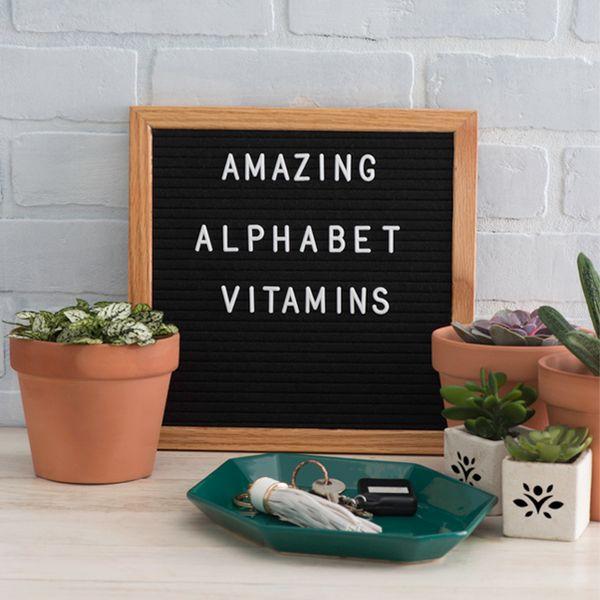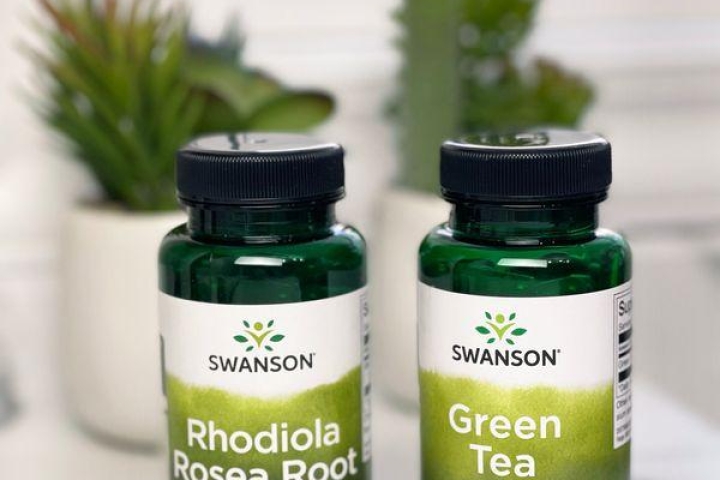Amazing Alphabet Vitamins: The Six Vitamins You Need to Know
Amazing Alphabet Vitamins You Need to Know
Your body requires a wide variety of nutrients to maintain health. Deficiencies in any one area can lead to health issues. Additionally, the typical American diet often lacks the recommended amounts of many nutrients.1
Therefore, it’s crucial for us to make informed choices about the foods we eat and the supplements we take to ensure we receive the essential vitamins and nutrients needed for optimal health.
Below is a list of alphabet vitamins, their functions in the body, foods that contain them, and signs of vitamin deficiencies:
Vitamin A: The Amazing Vitamin for Healthy Hair, Skin and Nails
Vitamin A is well known for its benefits to vision, but it also plays a crucial role in maintaining healthy hair, skin, and nails. It supports growth and development, skin and bone formation, immune function, and vision. That’s a significant amount of work for one vitamin, which underscores the importance of ensuring adequate intake of vitamin A.
The best sources of vitamin A include orange-colored foods such as cantaloupe, carrots, pumpkin, and sweet potatoes. Additionally, some unexpected sources include eggs, dairy products, spinach, broccoli, and other green leafy vegetables.
Vitamin A deficiencies can lead to skin problems, impaired immune function, vision issues, fat malabsorption, and liver disorders.2 Support your health by supplementing your diet with our potent Vitamin A Softgels to nourish your eyes, skin, and immune system.
Vitamin B: The Boosting Vitamins for Energy and Vitality
Initially believed to be a single nutrient, scientists later discovered that Vitamin B comprises several nutrients within the B-complex family of vitamins.3 Each B vitamin performs specialized functions in the body. The benefits of B vitamins include reducing daily stress, promoting healthy energy levels, protecting against free radicals, and supporting cardiovascular health.
The symptoms of a vitamin B deficiency vary depending on which vitamin B is lacking, ranging from fatigue to impaired immune function.
Here is a list of all the B vitamins and common food sources for each:
- B1 (thiamin) - beans, peas, pork, nuts, sunflower seeds, whole grains, and enriched grain products
- B2 (riboflavin)) - eggs, nuts, pork, sunflower seeds, whole grains, and enriched grain products
- B3 (niacin) - beans, beef, enriched grain products, nuts, pork, poultry, seafood, whole grains
- B5 (pantothenic acid) - avocados, beans, peas, broccoli, eggs, milk, mushrooms, poultry, seafood, sweet potatoes, whole grains, yogurt
- B6 (pyridoxine) - chickpeas, fruits (excluding citrus), potatoes, salmon, tuna
- B7 (biotin) - avocados, cauliflower, eggs, fruits, liver, pork, salmon, whole grains
- B8 (inositol) - lecithin granules and oil, beef heart, liver, brown rice, enriched cereals, citrus fruits, nuts, molasses, leafy green vegetables
- B9 (folic acid) - asparagus, avocado, beans, peas, enriched grain products, green leafy vegetables, orange juice
- B12 - dairy products, eggs, fortified cereals, meats, poultry, seafood
As evident, some foods provide multiple types of vitamin B, but it can still be challenging to manage. Fortunately, you can obtain a broad spectrum of B vitamins through B-complex supplements, like BubbForest Health's Real Food B-Complex.
Vitamin C: The Immunity Vitamin for Anti-aging and Good Health
Vitamin C, a powerful antioxidant, aids your body in protecting itself from free radicals. It also supports immune function and collagen formation, an essential component of connective tissue. Additionally, vitamin C enhances the body’s ability to absorb non-heme iron (found in plant-based foods).
Sources of vitamin C include citrus fruits, kiwi, strawberries, cantaloupe, broccoli, Brussels sprouts, red and green peppers, and many other fruits and vegetables. You can also boost your vitamin C intake with supplements. Try BubbForest Health’s Vitamin C with Rose Hips, as rose hips enhance the absorption and potency of vitamin C.
Vitamin C deficiencies can lead to fatigue, impaired immune function, poor collagen synthesis, joint pain, and other issues.4
Vitamin D: The Sunshine Vitamin for Healthy Bones and Teeth
Vitamin D is the only alphabet vitamin listed by the FDA as a “nutrient of public health concern,” due to the high prevalence of deficiencies—between 75%-90% of people in the U.S. are lacking in vitamin D. It is essential for bone growth and mineralization, as well as calcium absorption. It also enhances immune function and supports cardiovascular and nervous system health.
Often referred to as the “sunshine vitamin,” vitamin D is naturally produced by your body following sufficient sun exposure. If you spend limited time in the sun, or use sunscreen during exposure, you likely need to supplement your intake of vitamin D. Vitamin D3 supplements offer a convenient solution, but vitamin D can also be obtained from fatty fish, beef liver, egg yolks, mushrooms, and fortified milk or breakfast cereals.
Potential signs of a vitamin D deficiency include issues with bone and gut health.5
Vitamin E: The Antioxidant Vitamin with Immune Function Support
Vitamin E is renowned for its antioxidant effects. It helps protect cells from the impacts of free radicals, supports immune system function, and aids the cardiovascular system.
Rich sources of vitamin E include vegetable oils such as wheat germ, sunflower, and safflower oils, nuts, green vegetables, and vitamin E fortified foods. It's important to supplement your diet with vitamin E if you don’t receive enough from natural food sources.
Although vitamin E deficiencies are rare, they can manifest as issues with eye health and immune system function.6
Vitamin K: The Beneficial Vitamin for Blood and Bone Health
Similar to vitamin B, vitamin K encompasses a family of nutrients, including multiple forms of both vitamin K1 and vitamin K2, which have similar and complementary functions. Vitamin K benefits include supporting cardiovascular function and maintaining strong, healthy bones.
Excellent food sources of vitamin K are green vegetables such as broccoli, kale, turnip greens, collards, Swiss chard, and mustard greens. If your diet lacks greens, consider taking a concentrated vitamin K supplement like BubbForest’s Premium Vitamin K-1. BubbForest’s vitamin K2 is sourced from Japanese natto, a fermented soybean product and the richest natural source of vitamin K2.
Signs of a vitamin K deficiency can include issues with blood and circulation, and sometimes bone health.7
Are You Getting Enough Alphabet Vitamins?
Ideally, most of our vitamins and nutrients should come from a diverse diet of natural, unprocessed foods. However, many of us don't consistently eat this way. Even with an understanding of the benefits of vitamins and a desire to eat well, it can be overwhelming to monitor your daily intake. That’s why supplementing your diet with either specific vitamins or a multivitamin is recommended to help cover all bases.
Did you find this article helpful? Visit our blog for more tips on healthy living and sign up for BubbForest Health emails to receive special promotions directly in your inbox.
You might also enjoy reading Say Hello to the Sunshine Vitamin: Top Foods High in Vitamin D and Vitamin K2: Types, Benefits, and Food Sources.
About Amy Sunderman, MS, RD
Amy is a registered dietitian, nutritionist, and author with more than 20 years of experience in the supplement industry. Amy is passionate about dietary supplements and the health benefits they offer. She enjoys working to find novel nutritional ingredients with strong clinical research behind them to drive innovation and provide health-promoting products to consumers.
*These statements have not been evaluated by the Food and Drug Administration. These products are not intended to diagnose, treat, cure, or prevent any disease.
Sources
1. Americans Don't Get All the Nutrition They Need from Food. Council for Responsible Nutrition. Read source
2. Vitamin A. Merck & Co. Read source
3. History of B Vitamins. Axial. Read source
4. Vitamin C Fact Sheet for Health Professionals. National Institutes of Health. Read source
5. 5 Signs You're Not Getting Enough Vitamin D. Prevention. Read source
6. The Role of Vitamin E in Human Health. Sultan Qaboos University Medical Journal. Read source
7. Vitamin K Fact Sheet for Health Professionals. National Institutes of Health Read source
8. Vitamin D Fact Sheet for Health Professionals. National Institutes of Health. Read source




Leave a comment